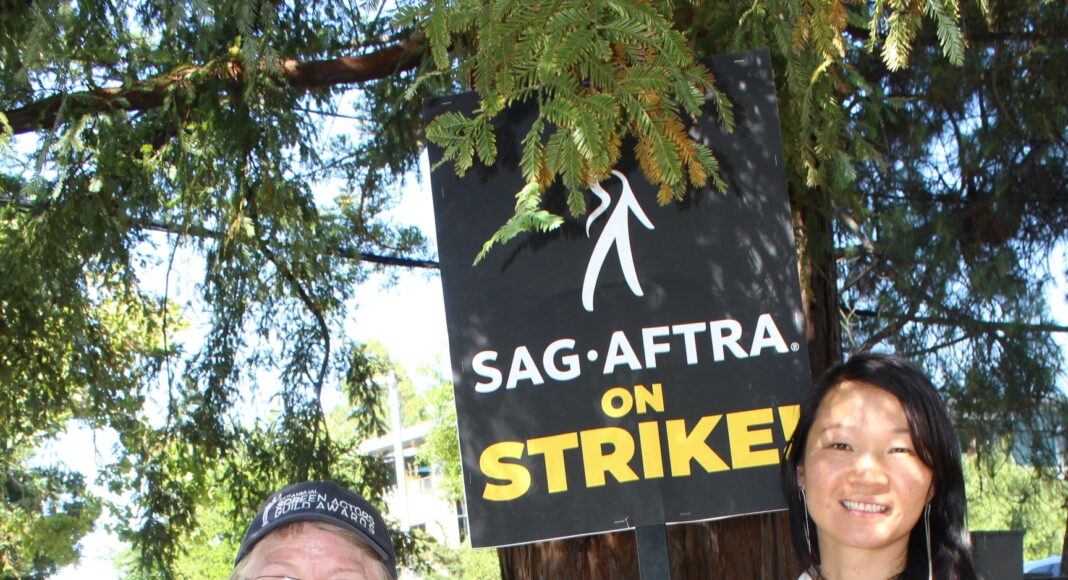Cries of “Union power!” rang out across Winchester Boulevard in the 91-degree Fahrenheit heat, as the actors’ strike arrived in Los Gatos.
On July 20, the Screen Actors Guild – American Federation of Television and Radio Artists (SAG-AFTRA) members picketed in front of Netflix’s corporate headquarters.
The relevance of Silicon Valley as an artificial intelligence incubator that’s bringing change to entertainment pay models was not lost on the demonstrators.
“This is our livelihood,” said Rick Haffner, a 63-year-old from Cupertino who’s been in SAG-AFTRA for some two decades, urging tech executives to work with actors on a new funding model. “Silicon Valley, take the lead!”
On May 2, the Writers Guild of America went on strike, after talks with the Alliance of Motion Picture and Television Producers broke down.
WGA waged a highly coordinated campaign that managed to shut down the majority of shoots in Los Angeles. Other, more limited, actions took place further afield.
SAG-AFTRA, the union representing 160,000 performers, joined the WGA’s movement on July 13, opening a new front in the war over compensation rules in the streaming era.
On July 19, Netflix announced it was phasing out its basic ad-free plan for American viewers, the Verge reported.
The company, which recently started cracking down on password sharing, increased its subscribers by 8% and now has 238.9 million global users, according to collider.com.
Nevertheless, it failed to meet investors’ expectations. Wall Street was hoping for the company, which was birthed in Scotts Valley, to deliver $8.3 billion in revenue—but it came up short with $8.19 billion (and $1.5 billion in profit), the website said.
It was on the heels of an 8% share price tumble that actors beat a path to its Los Gatos campus.
The location was an obvious Bay Area target, explained Kathryn Howell, president of the San Francisco-Northern California SAG-AFTRA local.
“There aren’t as many (studios) here,” she said, noting while Pixar and Lucasfilm are nearby, both are subsidiaries of Burbank-based Disney, whereas this is Netflix’s global home base. “Netflix is one of the big companies that sits on the other side of the table.”
Anthony Abate, from Sonoma, held up a paycheck for a penny from NBC Universal to illustrate how bad residuals can be—and why he feels the protests are vital.
“It’s about spreading the wealth,” he said. “Trickle-down economics has never worked.”
Abate was irked by a proposal from the studios that would see background actors hired for a day, to be scanned and recreated digitally in future scenes for no extra money.
Robert Chestnut, a 60-year-old Carmel-by-the-Sea resident whose credits include “Days of Our Lives,” “Airwolf” and “Bumblebee,” also joined the picket.
“We used to have network stations, movie releases and cable,” he said. “Now that we have streaming, everything’s changed.”
Part of the problem, he explained, is that Netflix isn’t transparent about how many people watch its shows.
The actors want 2% of streaming revenue, but it’s impossible to figure out what that figure is if studios keep this information to themselves, Chestnut said.
Chestnut’s message to Netflix’s board of directors chair Reed Hastings, who co-founded the company and has made his home just over the hill in Santa Cruz County?
“Get your head out of your ass and support our locals, our trained professionals,” he said.
Neither Netflix nor Hastings replied to requests for comment.














